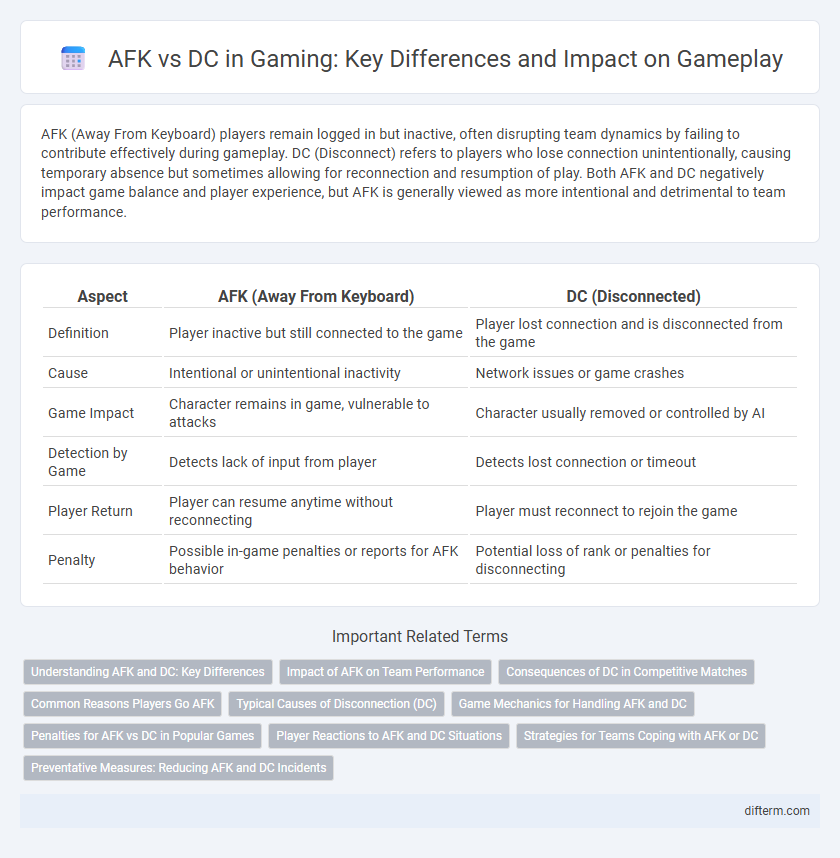AFK (Away From Keyboard) players remain logged in but inactive, often disrupting team dynamics by failing to contribute effectively during gameplay. DC (Disconnect) refers to players who lose connection unintentionally, causing temporary absence but sometimes allowing for reconnection and resumption of play. Both AFK and DC negatively impact game balance and player experience, but AFK is generally viewed as more intentional and detrimental to team performance.
Table of Comparison
| Aspect | AFK (Away From Keyboard) | DC (Disconnected) |
|---|---|---|
| Definition | Player inactive but still connected to the game | Player lost connection and is disconnected from the game |
| Cause | Intentional or unintentional inactivity | Network issues or game crashes |
| Game Impact | Character remains in game, vulnerable to attacks | Character usually removed or controlled by AI |
| Detection by Game | Detects lack of input from player | Detects lost connection or timeout |
| Player Return | Player can resume anytime without reconnecting | Player must reconnect to rejoin the game |
| Penalty | Possible in-game penalties or reports for AFK behavior | Potential loss of rank or penalties for disconnecting |
Understanding AFK and DC: Key Differences
AFK (Away From Keyboard) refers to a player intentionally stepping away from the game without disconnecting, often causing inactivity but maintaining the game connection. DC (Disconnect) occurs when a player's internet connection drops or the game client crashes, resulting in a sudden loss of connection and automatic removal or freezing in the game. Understanding these differences is crucial for game developers and players to implement effective penalties and improve matchmaking systems.
Impact of AFK on Team Performance
AFK (Away From Keyboard) players significantly degrade team performance by reducing active participation, causing imbalanced gameplay and forcing teammates to compensate for the missing player. This absence leads to strategic disadvantages, lowered morale, and increased likelihood of defeat due to lack of coordination and resource control. Persistent AFK behavior disrupts game flow and undermines competitive integrity, negatively impacting overall team success.
Consequences of DC in Competitive Matches
Disconnections (DC) in competitive gaming result in immediate forfeiture of the match or significant point penalties, severely impacting player rankings. Unlike AFK (away from keyboard) behavior, DC disrupts team coordination and can lead to a temporary ban or cooldown period. Persistent DC occurrences negatively affect matchmaking ratings and can damage a player's reputation within the competitive community.
Common Reasons Players Go AFK
Players commonly go AFK (Away From Keyboard) due to real-life interruptions, such as phone calls or urgent tasks, disrupting gameplay. Technical issues like lag, connectivity problems, or hardware malfunctions often cause players to become unresponsive. Fatigue and frustration from intense matches or toxic environments also contribute to players stepping away temporarily, impacting team dynamics and match outcomes.
Typical Causes of Disconnection (DC)
Typical causes of disconnection (DC) in gaming include unstable internet connections, server overloads, and hardware failures. Network latency spikes and ISP outages often lead to sudden DC, interrupting gameplay and causing players to lose progress. Power surges or crashes on user devices also contribute significantly to unexpected disconnections during online gaming sessions.
Game Mechanics for Handling AFK and DC
Game mechanics for handling AFK (Away From Keyboard) and DC (Disconnect) situations often include automated detection systems that identify inactivity or network loss, triggering penalties like temporary bans or reduced rewards to discourage unfair play. Many games implement reconnect features allowing players to rejoin matches without severe consequences, maintaining game balance and player engagement. Team-based games frequently integrate AI-controlled bots to replace AFK or disconnected players, preserving gameplay fluidity and competitive integrity.
Penalties for AFK vs DC in Popular Games
Penalties for AFK (Away From Keyboard) and DC (Disconnected) in popular games often vary, with AFK players typically facing harsher consequences such as temporary bans or reduced match rewards due to intentional inactivity. Disconnections caused by technical issues usually result in shorter cooldowns or grace periods, though repeated DCs can still lead to penalties like matchmaking restrictions. Games like League of Legends and Overwatch implement tiered punishment systems to deter AFK behavior while offering some leniency for genuine disconnections to maintain competitive balance.
Player Reactions to AFK and DC Situations
Players often express frustration and disappointment when teammates go AFK (Away From Keyboard) or experience DC (disconnect) during crucial gaming moments, as both situations disrupt team coordination and strategic execution. AFK players are typically viewed as neglecting responsibility, leading to negative chat reactions and reduced trust, while DC instances often elicit more sympathy due to technical difficulties but still impact overall team performance. The intensity of player reactions varies across game genres, with competitive esports titles showing the highest levels of vocal backlash and team morale decline after AFK or DC occurrences.
Strategies for Teams Coping with AFK or DC
Teams coping with AFK (away from keyboard) or DC (disconnected) players should prioritize adaptive strategies such as reassigning roles to cover essential functions and maintaining map control through coordinated positioning. Communication tools like quick pings and voice commands become critical to minimize confusion and exploit enemy weaknesses during numerical disadvantage. Implementing flexible team compositions and practicing resilience drills in training can enhance overall performance despite sudden player losses.
Preventative Measures: Reducing AFK and DC Incidents
Implementing robust server infrastructure minimizes latency and reduces disconnections (DC) during gameplay. Encouraging player engagement through periodic in-game prompts helps prevent Away From Keyboard (AFK) incidents by maintaining active participation. Regular updates and effective cheat detection systems further enhance game stability and discourage behaviors that lead to AFK or DC occurrences.
afk vs dc Infographic

 difterm.com
difterm.com